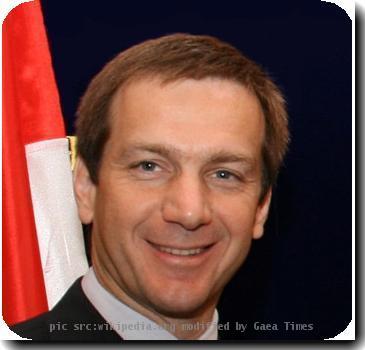Hungary’s center-right Fidesz gets landslide in national elections, far-right Jobbik is 3rd
By Pablo Gorondi, APSunday, April 11, 2010
Center-right Fidesz wins big in Hungary elections
BUDAPEST, Hungary — Hungary’s center-right party reclaimed the right to govern on Sunday, winning over 50 percent of the vote and handing the ruling Socialists a humiliating defeat. Extreme rightists backed by black clad paramilitary troops took more than 15 percent to come in third.
While widely forecast, the strong gain of the extreme right Jobbik party represented the greatest political shake-up of the election, shattering Hungary’s traditional post-communist status quo of a parliament dominated by the center right and the left.
Fidesz’s landslide victory had been expected by pollsters and its result of 52.8 percent in the first round translated into 206 seats for now in the 386-seat legislature.
The governing Socialists, whom many Hungarians blame for their dismal economy, were far behind with 19.3 percent and 28 seats, followed closely by the far-right, anti-Gypsy Jobbik with 26 seats and 16.7 percent — over three times as much as any other far-right party since the country’s return to democracy from communism in 1990.
The depth of the Socialist fall was reflected in a comparison of their present showing to that of the last election four years ago, when they garnered 43 percent support.
A green party, Politics Can Be Different, exceeded expectations with 7.4 percent and 5 seats ahead of a second round on April 25 when the fate of the remaining 111 seats is decided in runoffs for 57 constituencies where no candidate got at least half the votes.
“I can see that there is complete joy … but at the same time I know deep in my heart that I stand before the biggest task of my life,” Fidesz leader Viktor Orban, who was prime minister in 1998-2002, said as a huge crowd gathered outside the party’s election headquarters at downtown Vorosmarty Square. “People voted for unity, order and security.”
Jobbik, which burst onto the political scene last year with a nationalist platform blaming Gypsies and Jews for many of the country’s problems, claimed that only a series of scandals about some of its candidates created by the media prevented it from overtaking the Socialists.
“Despite the strong headwinds, Jobbik has managed to double its voters over the past year,” Jobbik president Gabor Vona said after preliminary results were announced by the National Election Office. “I still feel, however, that two-thirds of Hungarians are Jobbik supporters but don’t know it yet.”
To varying degrees, Jews and Gypsies have traditionally served as scapegoats in Eastern Europe for resident majorities during hard times. Jobbik has been able to inflate the traditional, relatively small base of extreme nationalist and anti-Semitic supporters with voters from Hungary’s struggling country villages where the lack of jobs and poverty-related thievery has exacerbated tensions with Gypsies, or Roma, as they are also called.
Jobbik’s rise also has been aided by the popularity of the Magyar Garda, or Hungarian Guard, an extremist group whose uniforms are reminiscent of those worn in the 1940s by the Arrow Cross, Hungary’s infamous wartime Nazi party.
The Garda was co-founded by Vona, the Jobbik leader, although he is no longer an active member. It was disbanded last year by the courts for breaking laws governing the operation of groups and associations, but it continues to exist under a new name.
The Garda’s most confrontational actions have been a series of marches through small countryside towns and villages meant to intimidate their large Gypsy populations and stop what Jobbik calls “Gypsy crimes” — mostly petty thefts too numerous and considered too minor for police to deal with.
An unprecedented series of Roma killings in 2008 and 2009 claimed six lives in several villages, reflecting the depth of hatred against the minority.
The Socialists owed their stunning defeat to loss of credibility amassed during eight years of government and deeply unpopular austerity measures imposed in the past months.
Despite the euphoria of Fidesz supporters, the party has a difficult task ahead. Hungary’s economy is mired in a recession which saw the economy contract by 6.3 percent last year and unemployment rise to a new high of 11.4 percent.
Fidesz highlighted making current officials accountable for the increasing number of corruption, emphasized job creation, a much simpler tax system, lower taxes and tighter regulation of the financial system. Details, however, were scarce.
Hungary is under the close watch of the International Monetary Fund, the biggest contributor to a standby loan of 20 billion euros ($27 billion) pledged in late 2008 as fears spread about Hungary’s possible default on its foreign debt.
Fidesz claims the “crisis management government” led by Gordon Bajnai during the past year has left skeletons piled up in the closet, an attempt to hedge its position about sticking to the tight 2010 state budget, which is planned to reach 3.8 percent of gross domestic product.
“The Fidesz government will try to do its best keep the budget as low as possible … but 3.8 (percent) is ridiculous,” said Fidesz spokesman Peter Szijjarto, while also acknowledging that a tight budget was “very important” for Hungary’s image in the financial markets.
“The new government may well try to test the patience of the IMF and the markets,” said a report from Goldman Sachs analyst Magdalena Polan. “However, we believe that it has limited scope for maneuver, as the currency is likely to respond to prolonged and rocky negotiations with the IMF … and any attempts to implement more populist campaign promises.”
Around 1.7 million Hungarian families are paying back mortgages and other loans taken out in foreign currencies — mostly in Swiss francs — and their payments rise when the forint weakens.
Associated Press writer George Jahn contributed to this report from Vienna.
Tags: Budapest, Eastern Europe, Europe, Gordon Bajnai, Hungary, Municipal Governments, Nationalism


